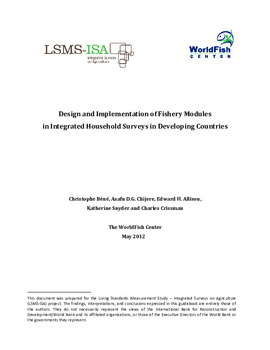Design and implementation of fishery modules in integrated household surveys in developing countries
Abstract
Fish and other aquatic animals contribute to the food security of citizens of developing countries, both as a source of income and as a component of healthy diets, yet fishing is not currently captured in most integrated household surveys. This sourcebook provides essential technical guidance on the design of statistical modules and questionnaires aimed at collecting fishery data at the household level. Background on the main policies important to the fishery sector, information on the data needed to analyze issues of policy relevance, and methodology on the construction of survey questions to collect necessary data are also provided. The document is organized to provide essential technical guidance on how to design statistical modules and questionnaires aimed at collecting fishery data at the household level. It includes an overview of the main technical and statistical challenges related to sampling fishery-dependent households. The document starts with an introductory section identifying the potential reasons why fisheries and in particular small-scale fisheries have not been adequately included in national statistical systems in a large number of countries. The report then proposes a succinct review of what is known (and what remains unknown) about small-scale fisheries and their contribution to the livelihoods of households in sub-Saharan Africa. It also provides readers with background on the main policies that are important to the fishery sector, information on the data needed to analyze issues of policy relevance, and methodology on the construction of survey questions to collect necessary data

